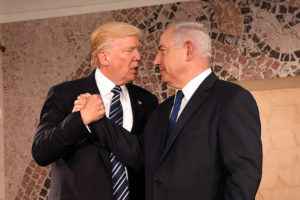A dramatic debate over Israel-Palestine is taking center stage in U.S. politics, and it shows no sign of dying down.

Alex Kane writes in 972 Magazine:
The last time there was a wide-open Democratic Party primary, Hillary Clinton and Barack Obama clashed on everything from the Iraq War to health care to race. Everything, that is, except for Israel.
Criticism of Israel during the 2007-2008 race was limited to fringe candidates. In a 2007 NPR debate, Mike Gravel, the gadfly former Senator from Alaska who never polled higher than 3 percent, asked why it was a problem that Iran funded Hamas and Hezbollah, while the U.S. funds Israel.
That was one of the only deviations from the standard pro-Israel line aired during the primary season — and the candidate making it wasn’t exactly a star. Gravel didn’t win a single delegate. While Clinton and Obama dutifully voiced support for Israel throughout the campaign, the U.S.-Israel relationship didn’t occupy a central place in the Democratic primary race.
A decade later, the debate over Israel has radically changed. It’s now playing out on the most prominent stage of American politics — the presidential race — and in the halls of Congress.
Senator Bernie Sanders (D-Vt.), who is polling third in the race to be the next Democratic presidential candidate, has repeatedly said he wants the U.S. to leverage its military aid to Israel to end Israel’s unjust treatment of Palestinians. Pete Buttigieg, the Indiana mayor polling in fourth place, said U.S. taxpayers should not foot the bill for an Israeli annexation of the West Bank. Senator Elizabeth Warren (D-Mass.), now battling for front-runner status with Joe Biden, has been less clear about her plan for Israel-Palestine. But she has spoken about the need for an end to Israel’s occupation, and in October, said she was open to conditioning U.S. military aid to Israel. As for Biden, he’s alone in saying that conditioning U.S. military aid to Israel would be “absolutely outrageous.”
Meanwhile, a new crop of progressives, led by Reps. Ilhan Omar (D-Minn.) and Rashida Tlaib (D-Mich.), are widening the debate on the U.S.-Israel alliance in Congress, calling for limits to U.S. military aid and hailing the tactics of boycott, divestment and sanctions as tools to change the status quo on the ground.
“There’s an increasing openness and willingness to talk in much more depth, and much more even-handedly, about the realities of the Israel-Palestine conflict,” said Logan Bayroff, spokesperson for J Street, the liberal, pro-Israel Jewish-American lobbying group. “A lot more space has opened up over the past 10 years, and especially over the past four years, during the Trump administration.”
This evolution is not incidental. The dramatic change in the U.S. debate over Israel-Palestine is the result of long-brewing shifts in party ideology, a series of striking events in Israel and the U.S and dogged organizing lead by Palestinian-Americans that has capitalized on these trends. The result of all this? A lively debate over the future of the U.S.-Israel relationship that shows no sign of dying down.
More …

